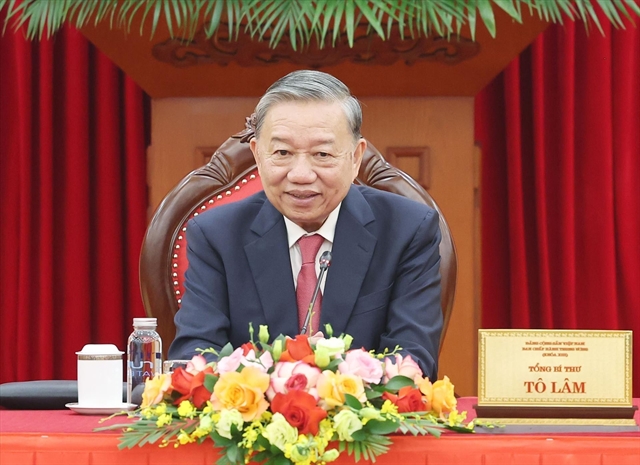 Politics & Law
Politics & Law

.jpg) |
| Secretary-General of the United Nations António Guterres delivers remarks at the opening session of the signing ceremony of the United Nations Convention against Cybercrime (also known as the Hanoi Convention). — VNA/VNS Photos |
Nguyễn Thu Hằng
HÀ NỘI — The UN Cybercrime Convention is a powerful, legally binding instrument to strengthen our collective defences against cybercrime.
Secretary-General of the United Nations António Guterres made the statement at the Opening for Signature of the United Nations Convention against Cybercrime (The Hanoi Convention) on Saturday in Hà Nội.
"It is a promise that fundamental human rights such as privacy, dignity, and safety must be protected both offline and online.
"It is a testament to the continued power of multilateralism to deliver solutions.
"And it is a vow that no country, no matter their level of development, will be left defenceless against cybercrime."
The Convention delivers a number of major breakthroughs, according to the Secretary General.
One of the most significant is the sharing of digital evidence across borders.
This has long been a major obstacle to justice — with perpetrators in one country, victims in another, and data stored in a third.
The Convention provides a clear pathway for investigators and prosecutors to finally overcome this barrier.
It is also a victory for victims of online abuse.
.jpg) |
| Secretary-General of the United Nations António Guterres greets participants attending the opening session of the signing ceremony of the United Nations Convention against Cybercrime. |
For the first time in any international treaty, the non-consensual dissemination of intimate images is recognised as a criminal offence.
The Convention also encourages strong protections for victims, including access to recovery, compensation, and the removal of illicit content.
By creating binding obligations, the Convention turns our commitments into practical safeguards.
It complements the Pact for the Future and the Global Digital Compact, which seek to bridge the digital divide, and strengthen global digital cooperation.
And it is consistent with the objectives of the recently established Global Dialogue on AI Governance and the Independent International Scientific Panel on AI.
Together, these commitments and mechanisms form a strong foundation to make digital spaces safe and secure.
“Today’s signing is an important milestone in our shared journey to a safer digital world. But it is only the beginning,” he said.
"The true power of the Convention will lie in turning signatures into tangible action.
"It must be ratified and entered into force, without delay. It must be implemented, effectively and in full. And it must be lived up to every day, by every party.
"The United Nations is here to walk this path with you."
Through the UN Office on Drugs and Crime the Secretariat of the Convention — and the UN Office of Legal Affairs, he said the UN would help countries bring this treaty into force, build capacity, strengthen investigations, and deepen cooperation across borders.
.jpg) |
| State President of Việt Nam Lương Cường greets participants attending the opening session of the signing ceremony of the United Nations Convention against Cybercrime. |
"I would like to thank Viet Nam for hosting this signing ceremony and for its leadership in bringing us together.
"The United Nations is proud to partner with Viet Nam in making this day possible.
"Let us seize this moment, and maximise the potential of this landmark agreement.
"Let us build a cyberspace that respects everyone’s dignity and human rights.
"And let us ensure that the digital age delivers peace, security, and prosperity for all."
The United Nations Convention against Cybercrime was initiated by the United Nations in 2019, stemming from the urgent need to build a comprehensive legal framework to address global challenges in non-traditional security, climate change and sustainable development.
After five years of negotiations, the United Nations General Assembly officially approved the convention by consensus on December 24, 2024.
The convention, consisting of nine chapters and 71 articles, provides a comprehensive approach to preventing and combating the global scourge of cybercrime and upholding human rights principles. It addresses technical and legal challenges by adapting traditional criminal investigation methods to the information and communications technology environment, while enhancing international cooperation.
Throughout the drafting process of the convention, Việt Nam has played an active and proactive role, demonstrated by hosting numerous international workshops that brought together experts from the United Nations Development Programme (UNDP), the World Health Organisation (WHO) and the United Nations Office on Drugs and Crime (UNODC). These discussions helped shape the convention’s content, focusing on key areas such as cybersecurity, environmental protection and poverty reduction.— VNS